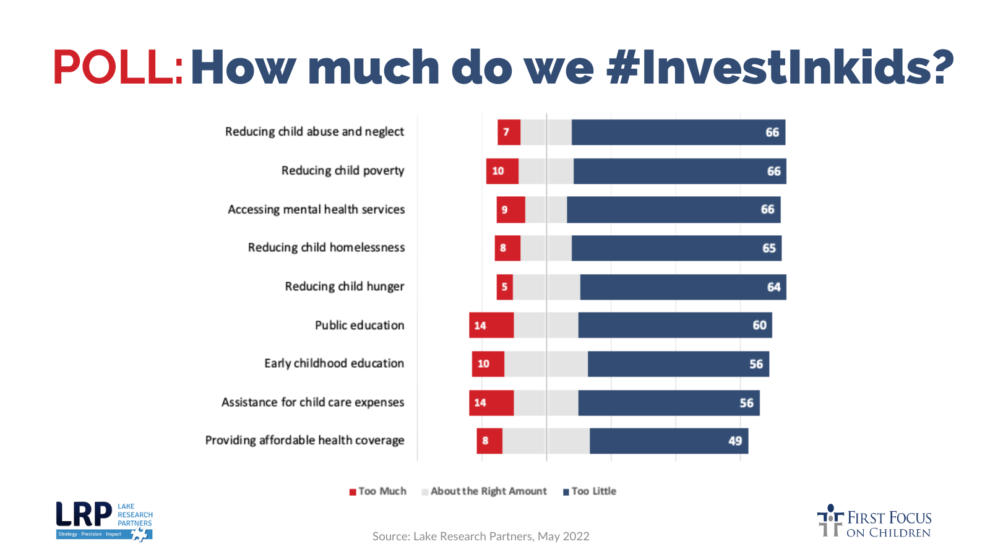American voters believe — by a roughly 6-to-1 margin — that the federal government is spending too little on the health, safety, and well-being of our children.
A nationwide poll of 1,000 likely voters conducted in May by Lake Research Partners found that Americans strongly support increasing our investments in children and prioritizing their needs in public policy, with education, child abuse, and child mental health, hunger, homelessness, and poverty leading their concern. Support for many specific programs, including the Child Tax Credit and making the Children’s Health Insurance Program permanent, crosses race, gender, and party lines.
“Emergency funding during the pandemic showed Americans what we can do when we invest in our children: slash poverty, slash hunger, keep kids from experiencing homelessness, give more of them health care and robustly protect their well-being,” said Bruce Lesley, president of First Focus on Children, which commissioned the poll. “We need to make this attention, care, and investment in our children the norm, not the exception.”
“Americans know there are real problems when it comes to kids, and they want an affirmative agenda to address those problems,” said Celinda Lake, president of Lake Research Partners. “People want to invest in our kids and grandkids because it is good for them and good for our society as a whole.”
Specific results:

By a 4-to-1 margin, American voters believe we are spending too little on:
- Public education (60-14%)
- Assistance for child care expenses (56-14%)
By at least a roughly 6-to-1 margin, American voters believe we are spending too little on:
- Funding that benefits children (56-10%)
- Early childhood education (56-10%)
- Affordable child health coverage (49-8%),
- Youth mental health services (66-9%)
- Reducing child poverty (66-10%)
- Reducing child homelessness (65-8%)
- Reducing child abuse and neglect (66-7%)
Voters, who were surveyed before the mass shootings in Buffalo, NY and Uvalde, Texas, said 3-to-1 that we invest too little in preventing gun violence against children (53-16%).
When asked about reducing child hunger, voters said 64-5% that we spend too little, a margin of 13-to-1.
Voters overwhelmingly favor the expanded and improved Child Tax Credit. Voters favor the expanded and improved Child Tax Credit contained in the American Rescue Plan Act by a 72-21% margin, with 57% voicing “strong” favorability. Parents favor the policy by 77-18%.
American voters are also deeply concerned about child poverty in the United States, a worry that also crosses party lines. Poverty is 59% higher among U.S. children than adults, and 83% of poll respondents said they found this fact concerning, with 60% saying they are “very concerned.” Even more — 86% — said they were concerned by the cost of child poverty, which runs an estimated $1.1 trillion a year due to higher crime, poor health outcomes and lower income levels when children grow up. Democrats expressed concern by a 97-3% margin (concerned/not concerned), Independents by 82-16%, and Republicans by 75-19%.
Voters also expressed overwhelming favorability for a current bipartisan bill to make the Children’s Health Insurance Program (CHIP) permanent, with 78-14% favoring the bill and 66% saying they favor it strongly.
Both of these items receive overwhelming support regardless of the voter’s race, gender or political affiliation.
Favorability of improved CTC:
- Democrats: 90-7%
- Independents: 62-22%
- Republicans: 55-37%
- Women:73-18%
- Men: 71-24%.
- White voters: 70-23%
- Black voters: 86-7%
- Hispanic voters: 79-16%
Favorability of making CHIP permanent:
- Democrats: 94-2%
- Independents: 78-13%
- Republicans: 60-26%
- Women: 83-7%
- Men: 72-21%.
- White voters: 76-15%
- Black voters: 90-6%
- Hispanic voters: 83-11%
Voters also are interested in putting supports, structures and standards in place to ensure that public policy accounts for the health, safety and well-being of the nation’s children. Voters agreed 82-13% that children need greater attention and coordination across our federal, state, and local governments.
By a 57-27% margin, voters support the creation of an independent Children’s Commissioner to help “protect and improve the care and well-being of children in the U.S.”
A majority of voters across all parties — 82-10% — also agreed that federal policies involving children should “always be governed” by a standard that makes the safety, protection or well-being of children “the first priority.” With respect to establishing a “best interests of the child standard,” Democrats support the policy change by 91-3%, Independents by 81-17%, and Republicans by 75-16%.
